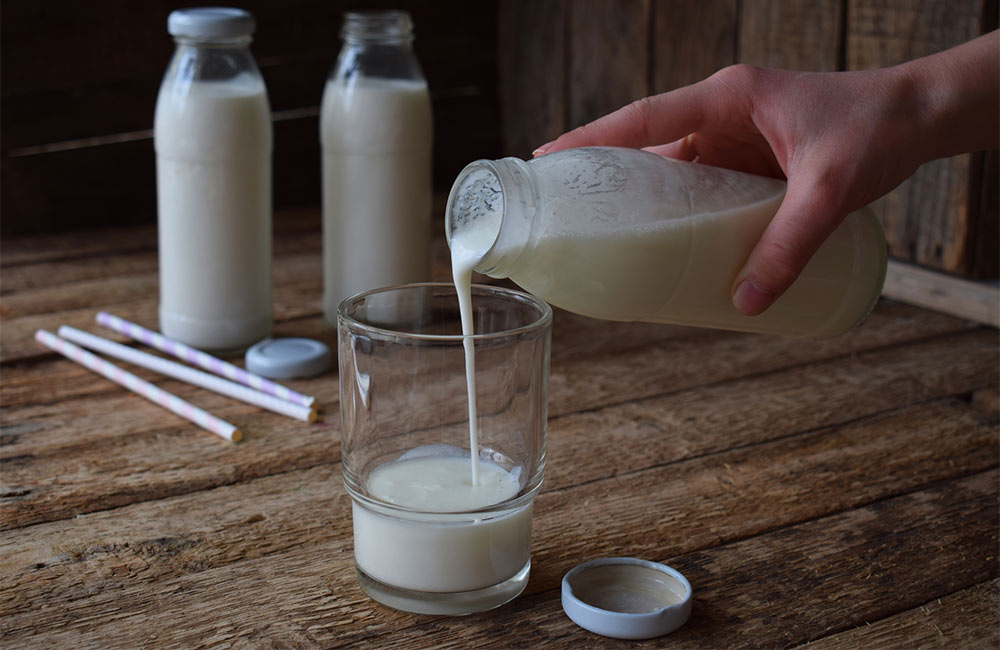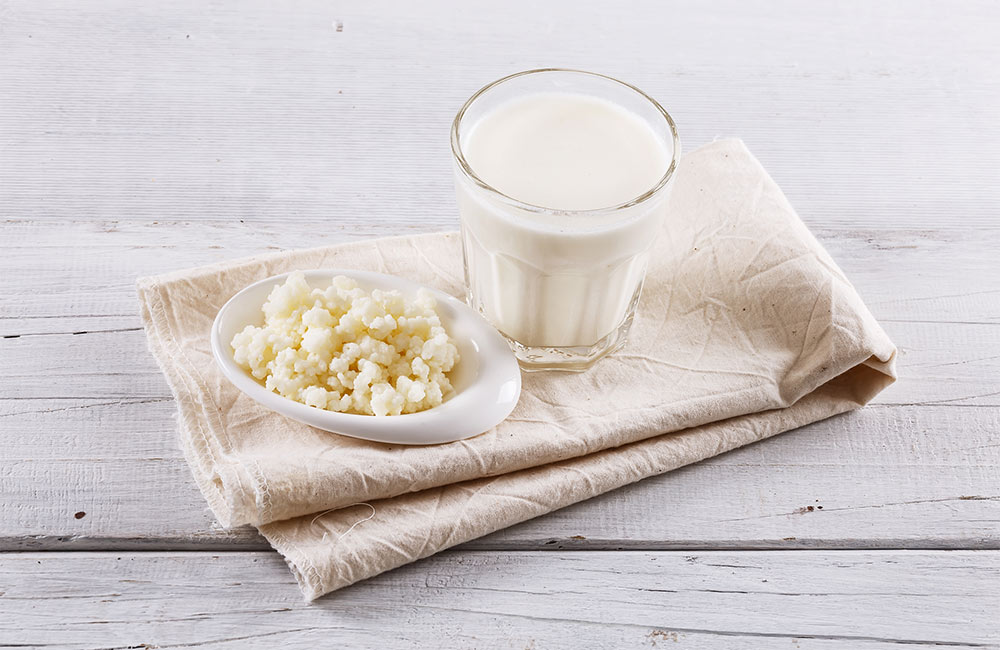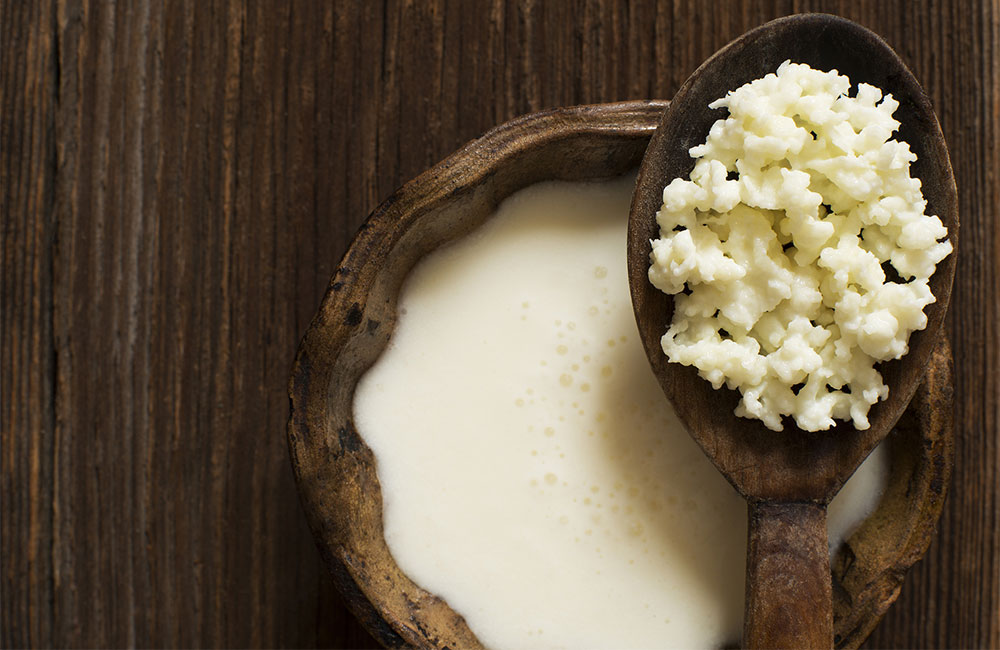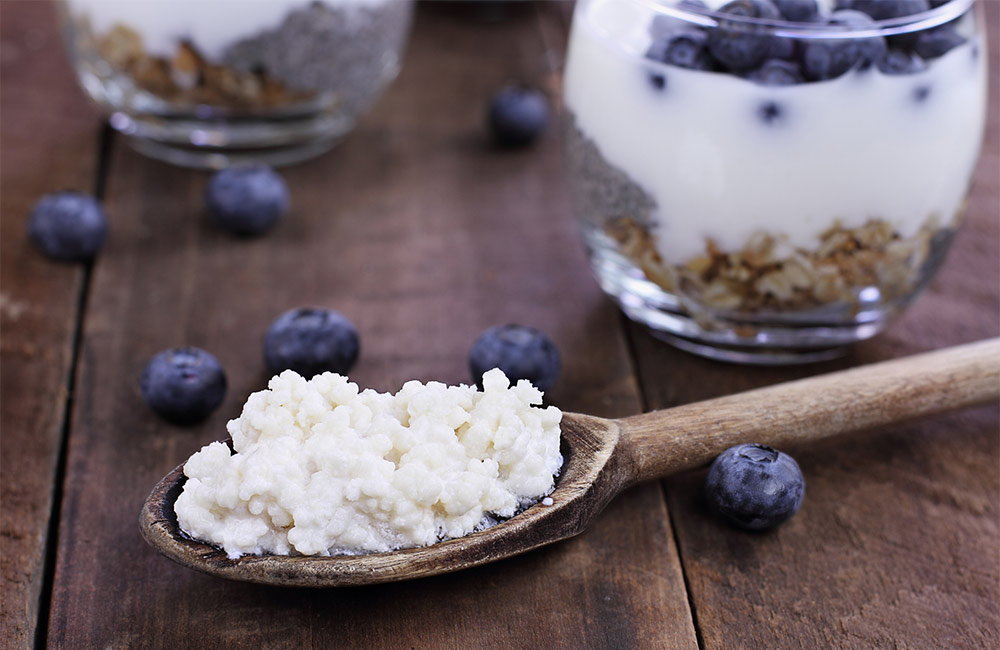Why You Should Replace Yoghurt with Kefir – Your Gut Will Thank You
Warning: Undefined variable $author_id in /home/rxlgpodj/domains/test10.co.za/public_html/C/wp-content/themes/crushmag/general-template.php on line 28
Kimchi, kombucha, apple cider vinegar – these fermented goods have started an entire culture and renewed interest in gut health. One of the oldest and undefeated natural remedies, kefir, has been healing tummies for centuries with its bubbly taste and fortifying benefits. Here’s everything you need to know about this good-for-your-gut food, and why you should consider replacing yoghurt with kefir in your breakfast smoothies.

Kefir populates the intestines with a diverse array of beneficial microbes, which help maintain a healthy balance of gut flora.
The Origins of Kefir
The name itself, kefir, alludes to its hazy history. According to the legend, the nomadic Ossetian shepherds, who carried kefir grains in bags made of goat skin, realised that the grains had been fermented into a milky substance.
Kefir’s origins trace back to the Caucasus Mountains (between Asia and Europe), where shepherds discovered the fermented beverage after noticing the curative properties of the grains they carried in their goat skin pouches. These grains, a symbiotic culture of bacteria and yeast, were believed to have been a divine gift from the Prophet Muhammad, earning them the moniker ‘Grains of the Prophet.’ *During the Muslim Conquest of Iran (mid-7th century A.D.), Islam was introduced to the Caucasus area, certain regions would later form part of Russia.

Some say that families often kept the fermented bags of kefir near the entrance of their home, hanging on the door, and when guests entered, it was common practice for them to punch or kick the bad to mix the ferment, every so often.
Another belief is that the word ‘kefir’ is derived from the word ‘kef’, which means ‘good feeling’ or ‘pleasure’ in Turkish.
Today, kefir is consumed across the globe, beyond the Caucasus region, and is available at grocery stores – kefir grains are also commonly sold online – but this wasn’t always the case. Back in the day, the Caucasus people guarded their kefir grains and kept them shielded from the rest of the world for nearly 2000 years. It wasn’t until the 19th century that people started to latch on to its magical gut properties, including Russian doctors.
How Kefir Became Popular
According to Elinoar Shavit’s Renewed Interest in Kefir, the Ancient Elixir of Longevity – Dr. Elie Metchnikoff, a Nobel Prize-awarded Russian immunologist, published research about the benefits of lactic acid bacteria in the early 1900s. He believed that the longevity of Bulgarian and northern Caucasus inhabitants was linked to their ferment-rich diets. Members of the All Russian Physician Society, who shared similar thoughts with Dr. Metchnikoff, were convinced that they needed to get their hands on the kefir grains the Caucasus people guarded.

Knowing the Caucasus people, the Russian physiologists knew that they wouldn’t easily offer the grains and sought the help of the Blandov brothers – wealthy businessmen who ran cheese factories in the Caucasus town, Kislovodsk. The brothers came up with a cunning strategy; they sent one of their employees, Irina Sakharova, to win over the tribal prince Bek-Mirza Barchorov, using her charm and beauty. The prince fell for her charm and asked Sakharova for her hand in marriage, but still refused to give her the grains.
Upon rejecting his marriage proposal, the prince tried to kidnap Sakharova, thankfully, the Blandov brothers saved her from the prince and the prospect of a forced marriage. Sakharova took the prince to the Czar’s court and the prince offered to pay her gold and gems, but Sakharova was after the grains. Prince Barchorov eventually decided to give in to her demands, handing over a large amount of kefir grains to Sakharova, who eventually gave them to the Blandov brothers to produce kefir in Moscow, in 1908.
The probiotics found in kefir stimulate the production of antibodies and enhance the activity of immune cells…
The gut-healthy drink was bought by doctors, who administered it to patients, and later amassed attention among the public and became one of the most consumed fermented drinks. But what makes kefir so special?
What Is Kefir?
At its core, kefir is a fermented milk drink made by inoculating milk with kefir grains. These grains, resembling small cauliflower florets or krummelpap, initiate the fermentation process by metabolising the lactose in milk into lactic acid, thereby giving kefir its characteristic tangy flavour. The fermentation also produces a wealth of beneficial bacteria and yeasts, including strains of lactobacilli and bifidobacteria, which contribute to kefir’s probiotic prowess.
Although yoghurt is typically made from bacterial cultures alone, kefir incorporates both bacteria and yeast…
While kefir is often described as ‘yoghurt-like’ – since both are fermented dairy products teeming with beneficial bacteria – they differ in purpose and appearance. Firstly, the microbial composition of kefir is more diverse than that of yoghurt, owing to the unique symbiotic culture of bacteria and yeast present in kefir grains. This diversity translates to a broader spectrum of probiotic strains, potentially offering enhanced gut health benefits. Additionally, kefir undergoes a longer fermentation process than yoghurt, resulting in a tangier taste and slightly effervescent texture. Although yoghurt is typically made from bacterial cultures alone, kefir incorporates both bacteria and yeast, further enriching its nutritional profile. Lastly, yoghurt has a thicker appearance compared to kefir.
The Benefits of Kefir
More than a tasty beverage, kefir is a nutritional dynamo packed with essential vitamins, minerals and macronutrients. A single serving of kefir provides a substantial dose of calcium, phosphorus, magnesium and vitamin B12, crucial for bone health, energy metabolism and nerve function. Kefir also boasts a significant protein content, making it a valuable source of amino acids essential for muscle repair and growth.

Gut Health Guru
Perhaps the most celebrated benefit of kefir lies in its ability to support gut health. As a potent probiotic, kefir populates the intestines with a diverse array of beneficial microbes, which help maintain a healthy balance of gut flora. This microbial harmony is paramount for digestive health, immune function, and even mental well-being, as emerging research suggests a strong connection between gut health and brain function.
Immune System Booster
Beyond its gut-centric benefits, kefir has been lauded for its immune-boosting properties. The probiotics found in kefir stimulate the production of antibodies and enhance the activity of immune cells, thereby fortifying the body’s defences against harmful pathogens. Regular consumption of kefir has been associated with reduced incidence and severity of infections, making it a formidable ally during cold and flu season. According to research, kefir is also believed to inhibit the presence of harmful bacteria like E.coli and candida.
Lactose Intolerance Friendly
Unlike regular milk, which can be problematic for individuals with lactose intolerance, kefir poses little to no trouble for those with dairy sensitivities. The fermentation process significantly reduces the lactose content of kefir, rendering it more easily digestible for individuals who struggle to tolerate lactose. This makes kefir a viable dairy option for those seeking to reap the benefits of milk without the discomfort.
Furthermore, scientists suggest that kefir may help with digestive conditions like irritable bowel syndrome, and is said to have anti-carcinogenic, antimicrobial, and antioxidant properties, potentially helping with a range of cancer types.
Versatile and Delicious
One of the most appealing aspects of kefir is its versatility. Whether enjoyed plain, blended into smoothies, or used as a tangy base for dressings and dips, it adds a delightful zing to any culinary creation. Its creamy texture and slightly effervescent nature make it a refreshing beverage on its own or a delightful addition to both sweet and savoury dishes.
While the health-promoting benefits are diminished when heat is applied, incorporating kefir into cooked dishes could be a great way to make the most of it if you have a surplus.
Want more? Discover the benefits of these gluten-free pseudograins.
Hungry for more? Subscribe to our Newsletter




Warning: Undefined variable $required_text in /home/rxlgpodj/domains/test10.co.za/public_html/C/wp-content/themes/upBootstrap3/comments.php on line 107
Warning: Undefined variable $aria_req in /home/rxlgpodj/domains/test10.co.za/public_html/C/wp-content/themes/upBootstrap3/comments.php on line 123
Warning: Undefined variable $aria_req in /home/rxlgpodj/domains/test10.co.za/public_html/C/wp-content/themes/upBootstrap3/comments.php on line 129